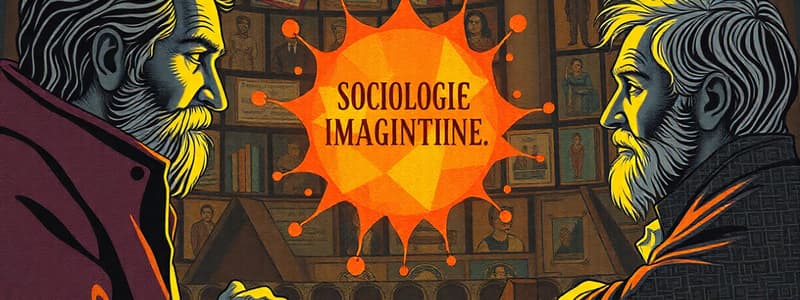Podcast
Questions and Answers
Match the following sociological concepts with their definitions:
Match the following sociological concepts with their definitions:
Sociological Perspective = Study of society and individual actions within social systems Sociological Imagination = Link between personal experience and broader social structures Mechanical Solidarity = Found in small, homogenous societies with shared beliefs Organic Solidarity = Found in more populated societies with increasing specialization
Match the revolutions to their impact in sociology:
Match the revolutions to their impact in sociology:
Industrial Revolution = Spurred the study of rapid social changes French Revolution = Emphasized political and social upheaval Theological Stage = Relies on supernatural or religious forces Positive Stage = Emphasizes reasoning, rational thought, experiment, observation
Match the thinkers with their notable ideas:
Match the thinkers with their notable ideas:
Saint-Simon = Socio-economic state determines thoughts and moralities Auguste Comte = Proposed a three-stage model of societal development Emile Durkheim = Division of labour in social development C.Wright Mills = Coined the term 'sociological imagination'
Match the stages of Comte's societal development model:
Match the stages of Comte's societal development model:
Match the disciplines that sociology interacts with:
Match the disciplines that sociology interacts with:
Match the type of solidarity to its description according to Durkheim:
Match the type of solidarity to its description according to Durkheim:
Match the key concepts with their corresponding descriptions:
Match the key concepts with their corresponding descriptions:
Match the following key ideas in sociology with their associated thinkers:
Match the following key ideas in sociology with their associated thinkers:
Match the following theorists with their central ideas:
Match the following theorists with their central ideas:
Match the following types of social action with their descriptions:
Match the following types of social action with their descriptions:
Match the following key terms with their meanings:
Match the following key terms with their meanings:
Match the following historical stages of society with their characteristics:
Match the following historical stages of society with their characteristics:
Match the following theories with their proponents:
Match the following theories with their proponents:
Match the following concepts with the theorists who proposed them:
Match the following concepts with the theorists who proposed them:
Match the following research methods with their types:
Match the following research methods with their types:
Match the following types of authority with their definitions:
Match the following types of authority with their definitions:
Match the following concepts with their implications in society:
Match the following concepts with their implications in society:
Match the following concepts with their effects on society:
Match the following concepts with their effects on society:
Match the following terms with their related social issues:
Match the following terms with their related social issues:
Match the following types of social interaction with their characteristics:
Match the following types of social interaction with their characteristics:
Flashcards
Sociological Imagination
Sociological Imagination
The ability to connect personal experiences to larger societal forces.
Mechanical Solidarity
Mechanical Solidarity
A society where individuals share common beliefs and values, leading to a sense of unity and shared purpose.
Organic Solidarity
Organic Solidarity
A society characterized by specialization and interdependence with diverse individuals and groups working together.
Social Development
Social Development
Signup and view all the flashcards
Theological Stage
Theological Stage
Signup and view all the flashcards
Metaphysical Stage
Metaphysical Stage
Signup and view all the flashcards
Positive Stage
Positive Stage
Signup and view all the flashcards
Sociological Perspective
Sociological Perspective
Signup and view all the flashcards
Anomie
Anomie
Signup and view all the flashcards
Anomic Suicide
Anomic Suicide
Signup and view all the flashcards
Class Struggle
Class Struggle
Signup and view all the flashcards
Historical Materialism
Historical Materialism
Signup and view all the flashcards
Alienation
Alienation
Signup and view all the flashcards
Religion in Marx's Thought
Religion in Marx's Thought
Signup and view all the flashcards
Proletariat Revolution
Proletariat Revolution
Signup and view all the flashcards
Capitalism & Religion
Capitalism & Religion
Signup and view all the flashcards
Social Stratification
Social Stratification
Signup and view all the flashcards
Verstehen (Interpretive Understanding)
Verstehen (Interpretive Understanding)
Signup and view all the flashcards
Ideal Type
Ideal Type
Signup and view all the flashcards
Bureaucracy
Bureaucracy
Signup and view all the flashcards
Types of Authority
Types of Authority
Signup and view all the flashcards
Habitus
Habitus
Signup and view all the flashcards
Bourdieu's Theory of Social Stratification
Bourdieu's Theory of Social Stratification
Signup and view all the flashcards
Study Notes
Sociological Perspective
- Sociology is the study of society, understanding individual actions and large social systems.
- Influenced by the Industrial and French Revolutions, which highlighted rapid social change and political upheaval.
- Sociological Imagination (C. Wright Mills): The ability to link personal experiences with broader social structures and see the relationship between history and individuals.
Key Thinkers and Concepts
- Saint-Simon: Believed societies' socioeconomic state shapes thoughts and moralities, emphasizing the importance of industrialization to societal change.
- Auguste Comte: Proposed a three-stage model of societal development (theological, metaphysical, positive), arguing that reason, observation, and experimentation are crucial for understanding society and achieving consensus.
- Emile Durkheim:
- Division of Labor: Differentiated between mechanical (small, homogenous societies) and organic (large, specialized societies) solidarity, highlighting the increasing individual freedoms in specialized societies.
- Social Facts: Social events can be explained by other social events.
- Anomie: A state of normlessness arising from weakened norms and values, leading to social disorder; studied in relation to suicide.
- Karl Marx:
- Class Struggle: Capitalism exploits workers, with the proletariat (working class) not receiving the full value of their labor while the bourgeoisie (owners) profit.
- Historical Materialism: Societies progress through economic stages (primitive communism, slavery, feudalism, capitalism).
- Alienation: Workers in capitalism experience alienation from the product, process, and other workers.
- Religion: Marx believed religion obscures reality to control the lower classes.
- Revolution: Marx predicted a proletariat revolution resulting in communist society.
- Max Weber:
- Capitalism & Religion: Linked the rise of capitalism to religious thought, particularly Calvinism.
- Social Stratification: Social differences based on class (economic position), status (prestige), and power.
- Verstehen: Emphasized empathetic understanding of social actions.
- Types of Action (Social Action): Traditional, emotional, value-rational, instrumental.
- Formal Rationality: Interested in the most efficient methods and procedures, including bureaucracy with task specialization, formal selection, rules, and career orientation.
- Authority: Differentiated between traditional, charismatic, and legal-rational authority.
- Ideal Type: A theoretical benchmark used for analyzing societies.
- Bureaucracy: A manifestation of formal rationality; while ideal, it can be inflexible and impersonal.
- Pierre Bourdieu:
- Social Stratification: Examined various forms of capital (economic, cultural, social, symbolic).
- Habitus: Internalized dispositions shaped by social environment.
Other Key Areas
- Interdisciplinary Nature: Sociology interacts with anthropology, political science, and other fields.
- Research Methods: Quantitative (statistical analysis) and Qualitative (ethnography, interviews).
- Case Studies: Used to generalize from specific situations.
- Ethical Issues: Importance of informed consent and confidentiality.
- Sociological Perspectives: Functionalism (society as a complex system), Symbolic Interactionism (focus on symbols and interaction), and Conflict perspective (focus on power struggles).
- Emerging Trends: Impact of technology, globalization, and digital communities.
Studying That Suits You
Use AI to generate personalized quizzes and flashcards to suit your learning preferences.




